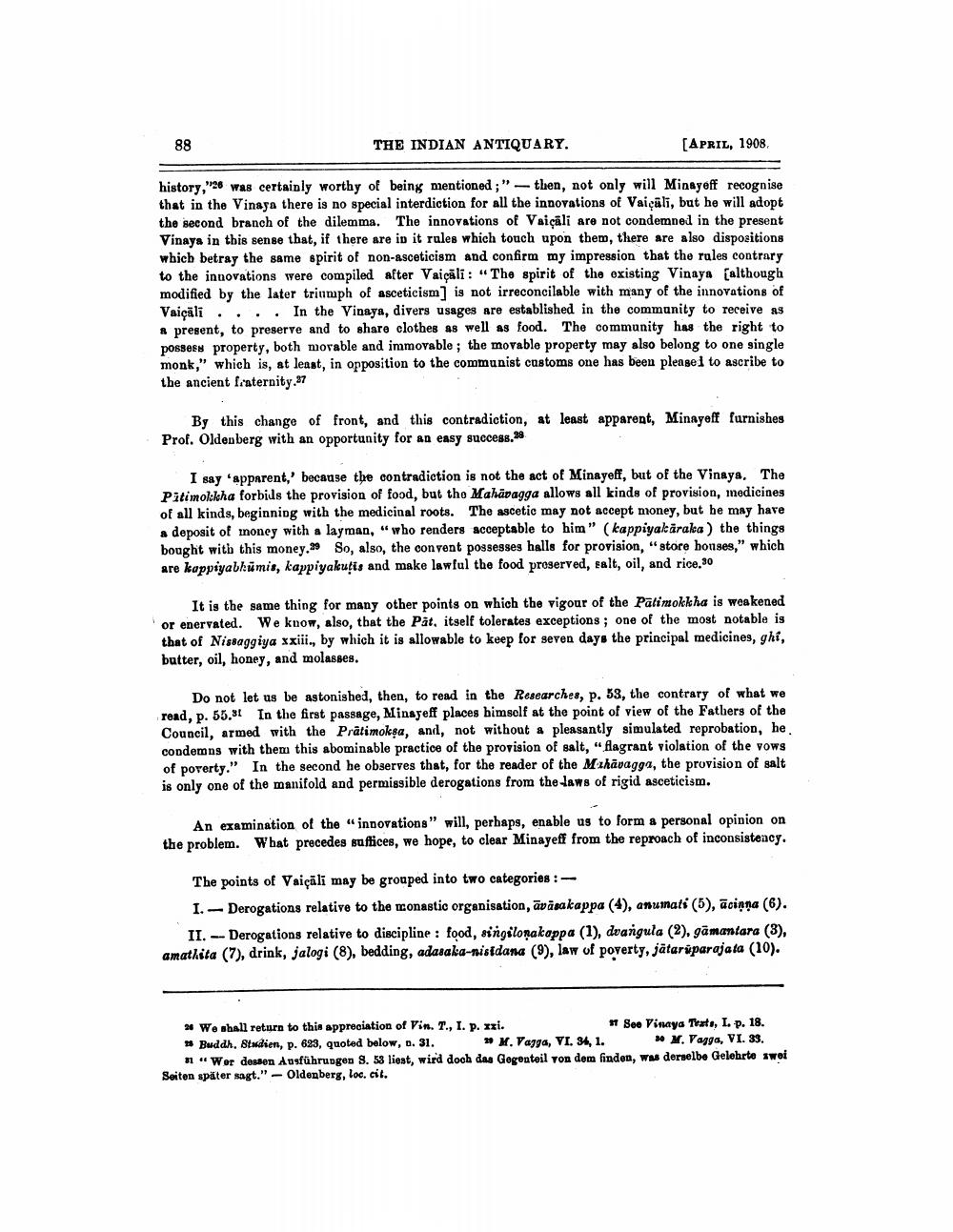________________
88
THE INDIAN ANTIQUARY.
[APRIL, 1908
history,"26 was certainly worthy of being mentioned;" tlen, not only will Minayeff recognise that in the Vinaya there is no special interdiction for all the innovations of Vaicāli, but he will adopt the second branch of the dilemma. The innovations of Vaicāli are not condemned in the present Vinays in this sense that, if there are in it rules which touch upon them, there are also dispositions which betray the same spirit of non-asceticism and confirm my impression that the rules contrary to the innovations were compiled after Vaicāli: "The spirit of the existing Vinaya (although modified by the later triumph of asceticism] is not irreconcilable with many of the innovations of Vaicali .... In the Vinaya, divers usages are established in the community to receive as * present, to preserve and to share clothes as well as food. The community has the right to possess property, both morable and immovable; the movable property may also belong to one single monk," which is, at least, in opposition to the communist customs one has been please I to ascribe to the ancient fraternity.37
By this change of front, and this contradiction, at least apparent, Minayeff furnishes Prof. Oldenberg with an opportunity for an easy success."
I say apparent,' because the contradiction is not the act of Minayeff, but of the Vinaya. The Pitimolekha forbids the provision of food, but the Mahāvagga allows all kinds of provision, medicines of all kinds, beginning with the medicinal roots. The ascetic may not accept money, but he may have a deposit of money with a layman, “who renders acceptable to him" (kappiyaläraka) the things bought with this money. So, also, the convent possesses halls for provision, "store houses," which are kappiyabkümis, kappiyakutis and make lawful the food proserved, salt, oil, and rice.30
It is the same thing for many other points on which the vigour of the Palimokkha is weakened or enervated. We know, also, that the Pat, itself tolerates exceptions; one of the most notable is that of Nissaggiya xxiii., by which it is allowable to keep for seven days the principal medicines, ghi, butter, oil, honey, and molasses.
Do not let us be astonished, then, to read in the Researches, p. 53, the contrary of what we read, p. 55. In the first passage, Minayeff places himself at the point of view of the Fathers of the Council, armed with the Prātimoksa, and, not without a pleasantly simulated reprobation, he condemns with them this abominable practice of the provision of salt, flagrant violation of the vows of poverty." In the second he observes that, for the reader of the Mhäpagga, the provision of salt is only one of the manifold and permissible derogations from the laws of rigid asceticism.
An examination of the "innovations" will, perhaps, enable us to form a personal opinion on the problem. What precedes suffices, we hope, to clear Minayeff from the reproach of inconsistency.
The points of Vaicāli may be grouped into two categories :I. - Derogations relative to the monastic organisation, āvāsakappa (4), anu mati (5), āciņna (6).
II. - Derogations relative to discipline : food, singilonakappa (1), dvangula (2), gamantara (3), amathita (7), drink, jalogi (8), bedding, adasaka-nisidana (9), law of poverty, jätarüparajata (10).
# We shall return to this appreciation of Vin. T., I. p. zzi.
# Seo Vinaya Texts, L. p. 18. * Buddh, Studien, p. 623, quoted below, D. 31.
M. Vaga, VI. 34, 1.
M. Vaga, VI. 33. 1 "Wer dessen Ausführungen S. 58 liest, wird doch das Gegenteil von dem finden, was derselbe Gelehrte swoi Seiten später sagt." -Oldenberg, loc. cit.




